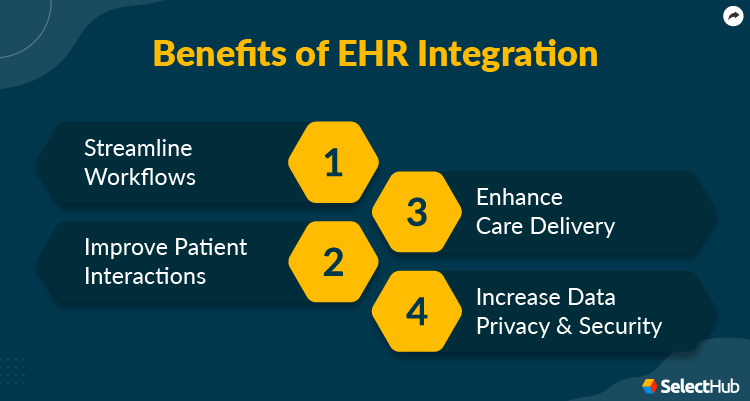The Benefits of Electronic Health Records (EHR)
In today’s digital age, Electronic Health Records (EHR) have revolutionized the healthcare industry. EHRs offer numerous advantages over traditional paper-based records, improving patient care, enhancing efficiency, and streamlining healthcare processes. In this article, we will explore the benefits of EHR and why they are crucial for healthcare providers.
Improved Accessibility and Efficiency
One of the significant advantages of EHR is the ease of accessibility to patient information. With electronic records, healthcare professionals can quickly retrieve patient data, including medical history, test results, and prescriptions, with just a few clicks. This accessibility leads to improved efficiency in delivering patient care, as healthcare providers can access critical information instantly, making informed decisions promptly.
Enhanced Patient Safety
EHRs play a vital role in enhancing patient safety. Through the use of electronic records, healthcare providers can minimize errors and improve accuracy in patient care. Electronic prescribing reduces the risk of medication errors by providing real-time alerts for potential drug interactions or allergies. Additionally, EHRs facilitate the sharing of patient information among healthcare providers, ensuring that all involved parties are well-informed about a patient’s medical history, medications, and treatment plans, thus reducing the likelihood of adverse events.
Streamlined Workflow
Implementing EHR systems can significantly streamline healthcare workflows. With electronic records, healthcare providers can automate various administrative tasks, such as appointment scheduling, billing, and insurance claims processing. This automation reduces the burden of paperwork, allowing healthcare professionals to focus more on patient care. Moreover, EHRs enable seamless communication and collaboration among healthcare teams, ensuring efficient coordination of care.
Improved Data Accuracy and Decision-Making
EHRs eliminate the risks associated with illegible handwriting or misplaced paper records. By digitizing patient information, healthcare providers can ensure accurate and complete documentation of medical data. This accuracy leads to better decision-making, as healthcare professionals have access to comprehensive patient information, enabling them to diagnose conditions more effectively and develop personalized treatment plans.
Enhanced Data Security and Privacy
Privacy and security of patient data are of utmost importance in healthcare. EHR systems employ robust security measures to protect sensitive patient information from unauthorized access or breaches. Access controls, encryption, and audit trails are implemented to ensure data confidentiality. Additionally, EHRs offer the advantage of data backup and disaster recovery, minimizing the risk of data loss due to unforeseen circumstances.
Cost Savings
Implementing EHR systems can lead to significant cost savings for healthcare providers. By reducing the need for paper records, storage space, and manual administrative tasks, healthcare organizations can allocate resources more efficiently. Additionally, EHRs enable better coordination of care, reducing duplicate tests and unnecessary procedures, and ultimately lowering healthcare costs for both providers and patients.
Electronic Health Records (EHR) offer a multitude of benefits that improve patient care, enhance efficiency, and streamline healthcare processes. The improved accessibility, enhanced patient safety, streamlined workflows, improved data accuracy, enhanced data security, and cost savings make EHR systems indispensable in today’s healthcare landscape. By embracing EHR technology, healthcare providers can provide better care, make informed decisions, and ultimately improve patient outcomes.
Frequently Asked Questions about the Benefits of Electronic Health Records (EHR)
1. What are the main benefits of implementing EHR in a healthcare setting?
EHRs offer improved patient care coordination, increased efficiency, reduced medical errors, enhanced patient safety, and better overall healthcare outcomes.
2. How do EHRs improve patient care coordination?
EHRs allow healthcare providers to easily access and share patient information, ensuring that all involved parties have the most up-to-date and accurate data. This leads to better coordination of care among different healthcare professionals.
3. Can EHRs help in reducing medical errors?
Yes, EHRs have built-in features that help minimize errors, such as medication interaction alerts, allergy warnings, and automated reminders for preventive screenings. These features help healthcare providers make more informed decisions and avoid potential mistakes.
4. What impact do EHRs have on patient safety?
EHRs improve patient safety by reducing the risk of lost or misplaced paper records, minimizing errors in medication administration, and providing accurate and complete patient information to healthcare providers, especially in emergencies.
5. How do EHRs contribute to increased efficiency in healthcare settings?
EHRs streamline administrative tasks, automate documentation processes, and eliminate the need for manual record-keeping. This saves time and allows healthcare providers to focus more on patient care, ultimately improving efficiency.
6. Can EHRs improve the overall quality of healthcare outcomes?
Yes, EHRs enable healthcare providers to access comprehensive patient histories, track treatment progress, and identify patterns in health data. This leads to better-informed decision-making, personalized care plans, and ultimately improved healthcare outcomes.
7. Do EHRs enhance patient engagement and involvement in their care?
Yes, EHRs often provide patients with secure online access to their health records, appointment scheduling, and communication with healthcare providers. This empowers patients to actively participate in their care and make informed decisions.
8. How do EHRs contribute to cost savings in healthcare?
EHRs reduce costs associated with paper-based records, transcription services, and duplicate tests or procedures due to lost or inaccessible information. They also help identify cost-effective treatment options and improve billing accuracy.
9. Can EHRs help in medical research and population health management?
Yes, EHRs provide a wealth of data that can be anonymized and used for medical research, population health analysis, and public health initiatives. This data can help identify trends, evaluate treatment effectiveness, and improve healthcare policies.
10. Are there any privacy and security concerns associated with EHRs?
While EHRs offer numerous benefits, privacy and security concerns are important considerations. Healthcare organizations must implement robust security measures, encryption protocols, and access controls to safeguard patient information from unauthorized access or breaches.





